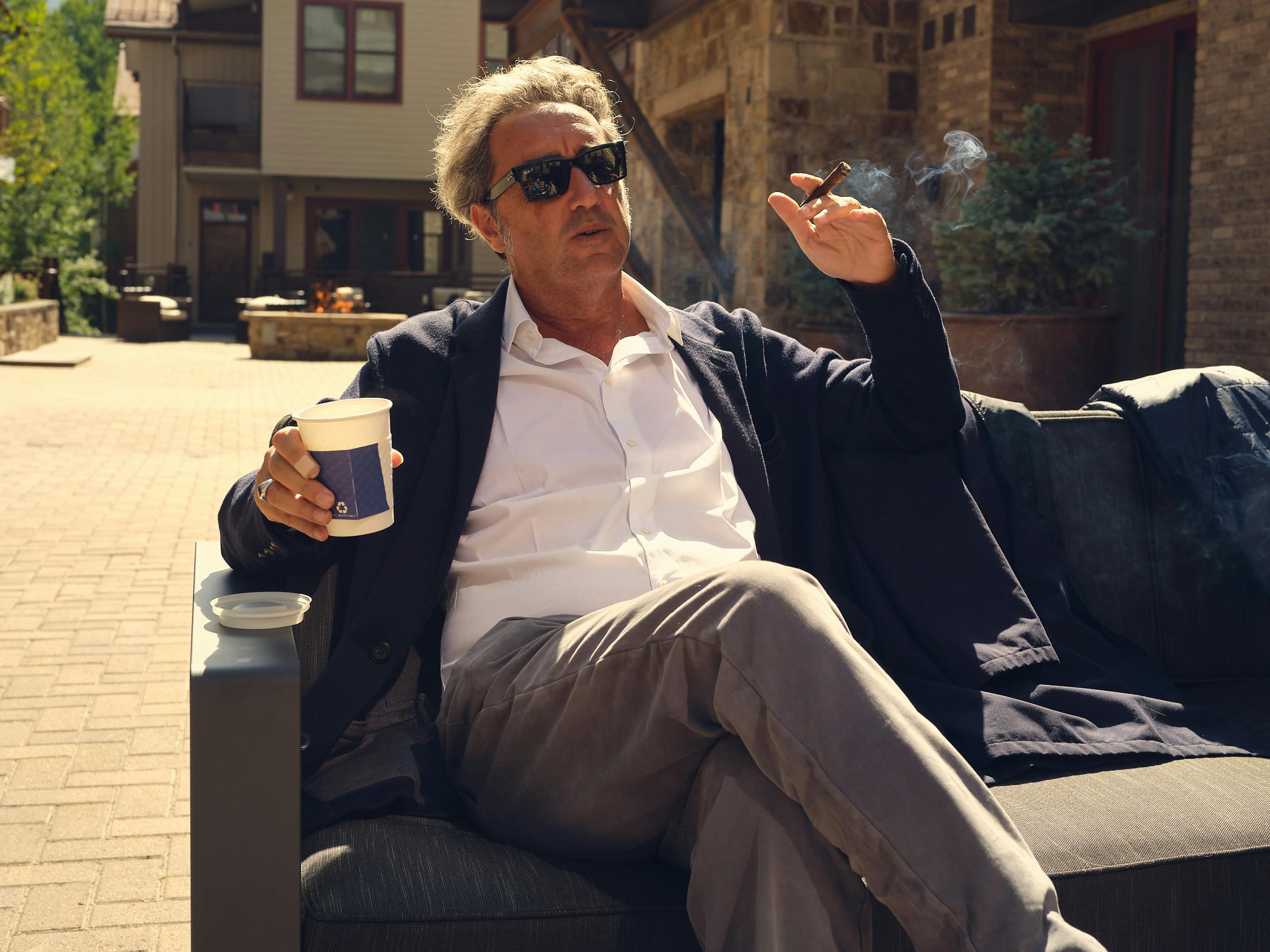Joe Wright asks the Italian filmmaker about his coming-of-age film, The Hand of God.
In Italian filmmaker Paolo Sorrentino’s semi-autobiographical coming-of-age tale The Hand of God, avowed soccer fan Fabietto (Filippo Scotti) is on the precipice of adulthood in his hometown of Naples. When an unimaginable tragedy strikes and both of his parents are killed, the young man is sent reeling by grief. As Fabietto moves toward an uncertain future, his large and extremely colorful extended family all around him, it is an unexpected encounter with a local director that ignites a creative spark in Fabietto’s soul, offering him a path toward a new life.
Sorrentino, the masterful writer-director known for films including Youth and Academy Award-winner The Great Beauty, had considered telling the tale for some time, but only recently felt that he had the maturity and experience to attempt to bring the intimate story — by turns joyful and heartbreaking — to the screen.
“The reason why I did this movie about my teenage moment now is because I feel less confident about the things I know,” Sorrentino says. “When I was younger, I presumed to know many things. Now that I am more than 50 years old, I’m realizing that I am not sure about things. I thought that a movie about my family, my city where I grew up, and my memories was something that I knew very well, so maybe there was the opportunity to do an honest and believable movie.” Sweeping views of Naples, tender and humorous moments with family, and a poignant portrait of adolescence come together to create the unmissable The Hand of God, now a Critics Choice nominee for Best Foriegn Language Film.
The Hand of God has won across-the-board critical acclaim for its naturalistic performances and assured direction, and it’s found supporters among the international community of filmmakers as well. Among those fans is Joe Wright, the award-winning English director whose résumé includes such powerful dramas as Atonement, Darkest Hour, and his latest, Cyrano.
Wright recently interviewed Sorrentino about his approach to making The Hand of God for Directors UK. An edited version of the conversation follows.
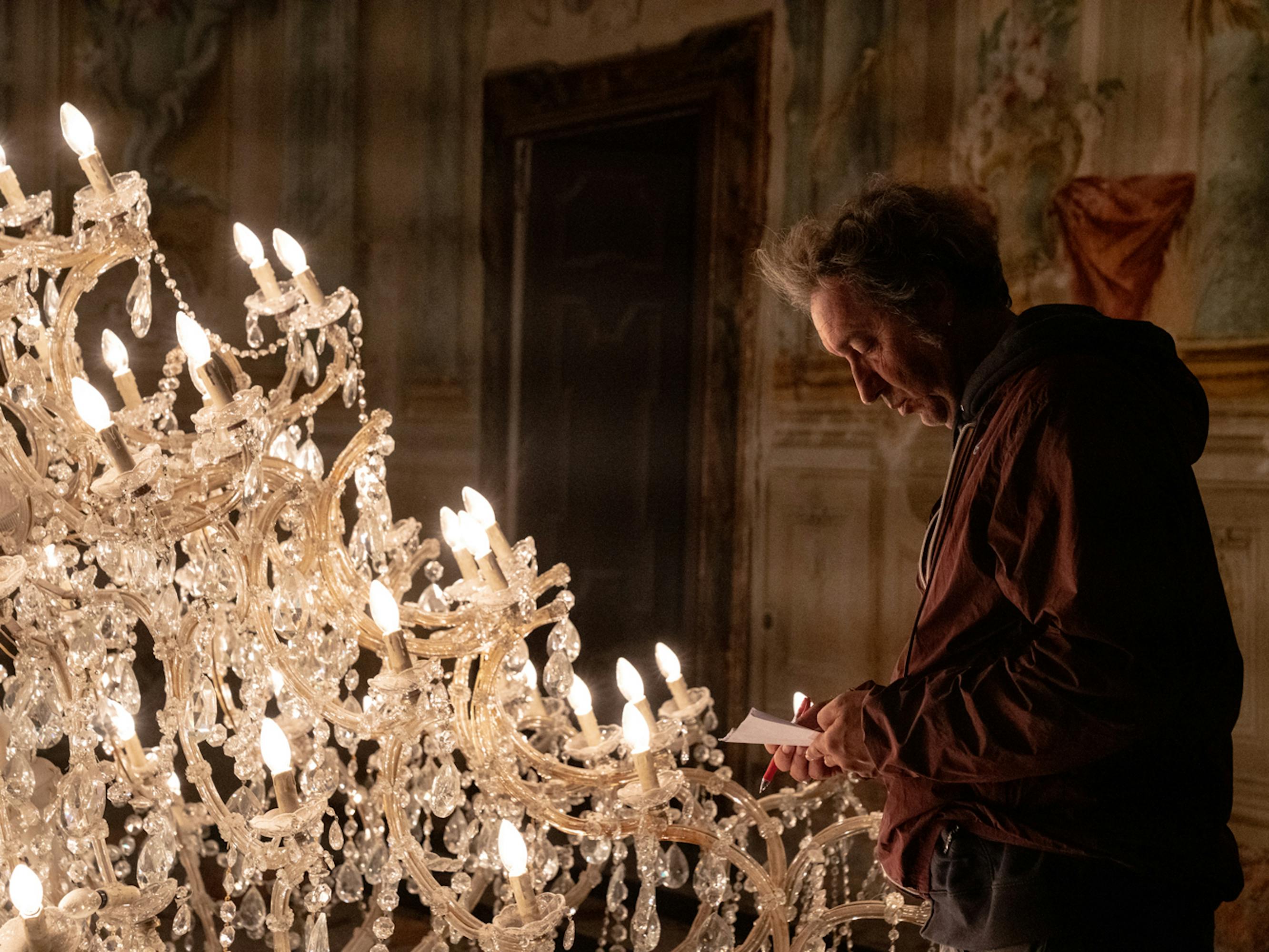
Paolo Sorrentino
Joe Wright: So Paolo, I’ve thought about doing an autobiographical movie, and I’ve always shied away from it. I think that my family, like all families, has legends that, if I scratched beyond the surface, I would probably discover to be myths. What made you do it now, and did you uncover things about your family that you weren’t aware of previously?
Paolo Sorrentino: The real thing that I found out about my family while doing the movie is how much I loved my parents. Of course, I thought that I loved them, but after I saw the movie, I realized that my love was bigger than my first idea about them. Also my memories about them were filtered by this huge love.
JW: Did you simply write down your memories or did you talk to other family members and ask their point of view on different events?
PS: No. I didn’t need to do research because my relatives [had] told me many things about my family, about the different points of view. I knew everything I needed to know in order to write the movie. I had a notebook full of stories that had come to mind over the years, stories about my family and my life when I was [a teenager].
I wrote the movie following a very simple idea of structure, to split the movie in two parts. In the first part, there is an explosion of joy and of love and an idea of the beauty of this family, this city, this summer. The second part of the movie is exactly the opposite. There is a turning point in the middle of the movie that brings the movie to a sort of tragedy. It was clear to me to split the movie into these two parts: comedy and tragedy.
JW: The splitting of the movie down the middle, I find interesting and unusual. Was that something you ever worried about?
PS: No, I was not very worried because I loved that structure. I have always been a big lover of Stanley Kubrick’s movie Full Metal Jacket, and Full Metal Jacket is split in two parts. There is the first act and the second act, and in my opinion, that’s a masterpiece. So, I love that structure of the two acts: very separate, very different. At any rate, it was the only idea that I had for this movie, so I followed that idea.
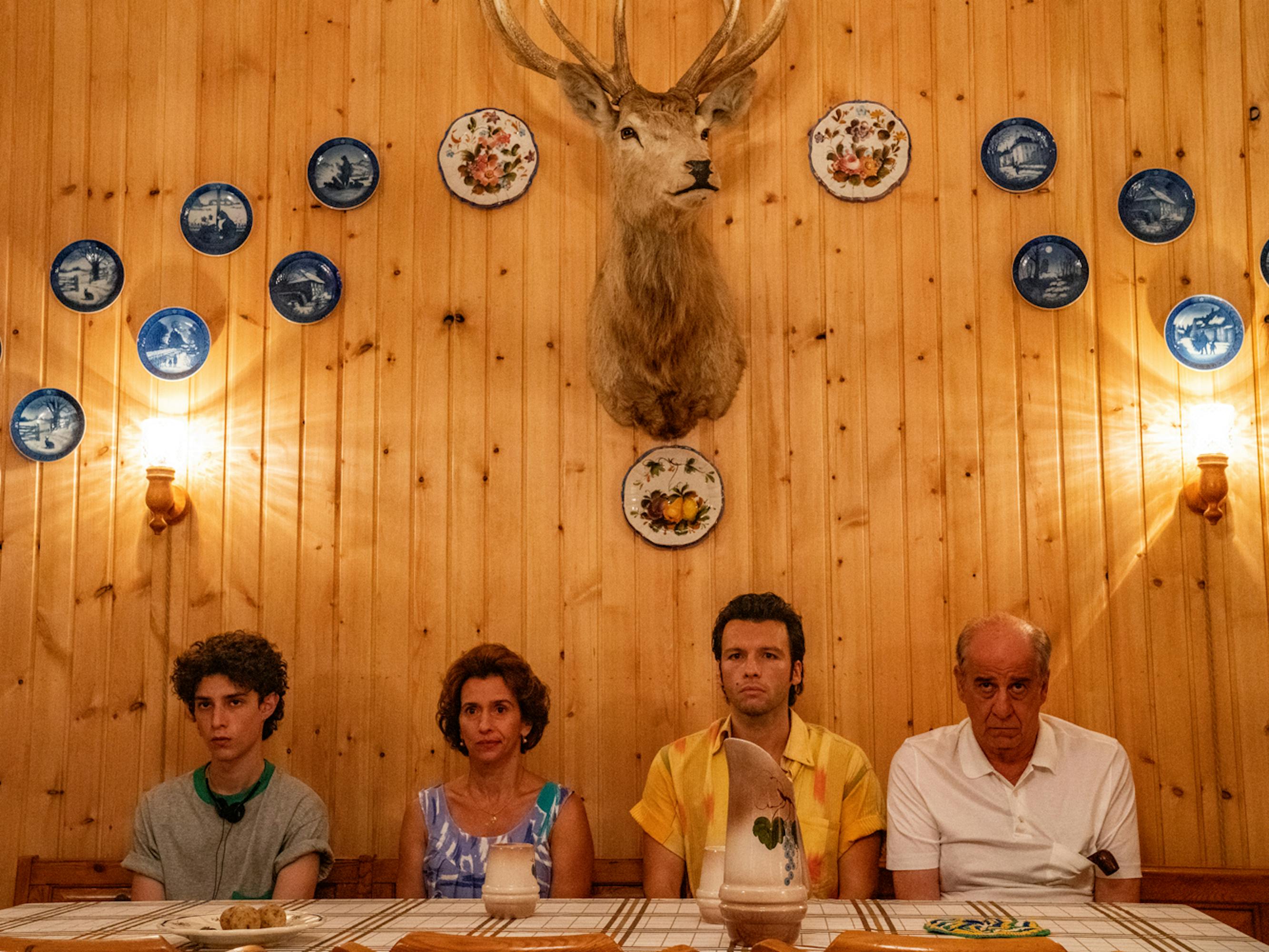
The cast of The Hand of God
JW: When you say it’s based on autobiographical events, how far did you stray from the truth?
PS: The feelings are always true — I had this idea that the feelings of the character should always be close to the truth. Many things in the movies are true. But I was not very faithful to the chronology; some things that happened to me when I was eight years old, I put in a different moment of my life. But, of course, all the scenes about the tragedy of the accident are very close to the reality [of what happened]. I thought that I could lie about funny things, but for me it was impossible to lie about the tragedy of the movie.
JW: Tell me about your relationship with actor Toni Servillo, who has appeared in many of your films and plays the role of Fabietto’s father here. Do you tell him that you are writing something for him before you’re writing it? Or do you just deliver the script when it’s done?
PS: I talked to him about this movie for many years, and I told him if I found the courage to do this movie that I [would love it if] he played my father. He was very kind because he said, “O.K., I don’t need to read the script. I will play this role.” We are friends, and we’ve known each other now for more than 20 years. He was a very well-known theater actor, but he [didn’t have much] experience in the movies when I met him. I was a young person with a dream to make movies. When we met, we started to make movies together. We grew up together.
JW: I always think the movement of your camera is weightless somehow, like the movement of the camera in Wings of Desire. Can you talk to me about your relationship with your cinematographer Daria D’Antonio and camera movement? I sit in a room with my D.P. for a couple of weeks prior to shooting, and we talk about the script. Is that something you do?
PS: We have done many, many movies together and know each other very well, so we didn’t feel the need to talk too much about the movie. And then, I don’t like to talk too much about a movie before doing it. I just told her that I was looking for something different from the previous films I’d done. I was looking for something simpler and [more natural] because of the story, because of the script I had in my hand. She agreed. A few weeks before shooting, she asked me about my memory about light when I was a child, when I was young. I told her some things. She did the light herself, just following my memories. But I have to say that Daria comes from my city. We grew up in the same city. We have the same friends. She recognized my world without needing me to explain my world, my life.
JW: When the actors come to set and you’re filming, is there any element of improvisation? Or is it all very tightly scripted?
PS: I prefer that they are close to the script. I don’t love too much improvisation. A couple of actors that I had in The Great Beauty, they were funny actors. They were able to invent jokes in a few seconds, and in that case, I followed their improvisation. Otherwise, I lose myself if the actors start to improvise. I don’t understand what’s going on. I lose control of things.
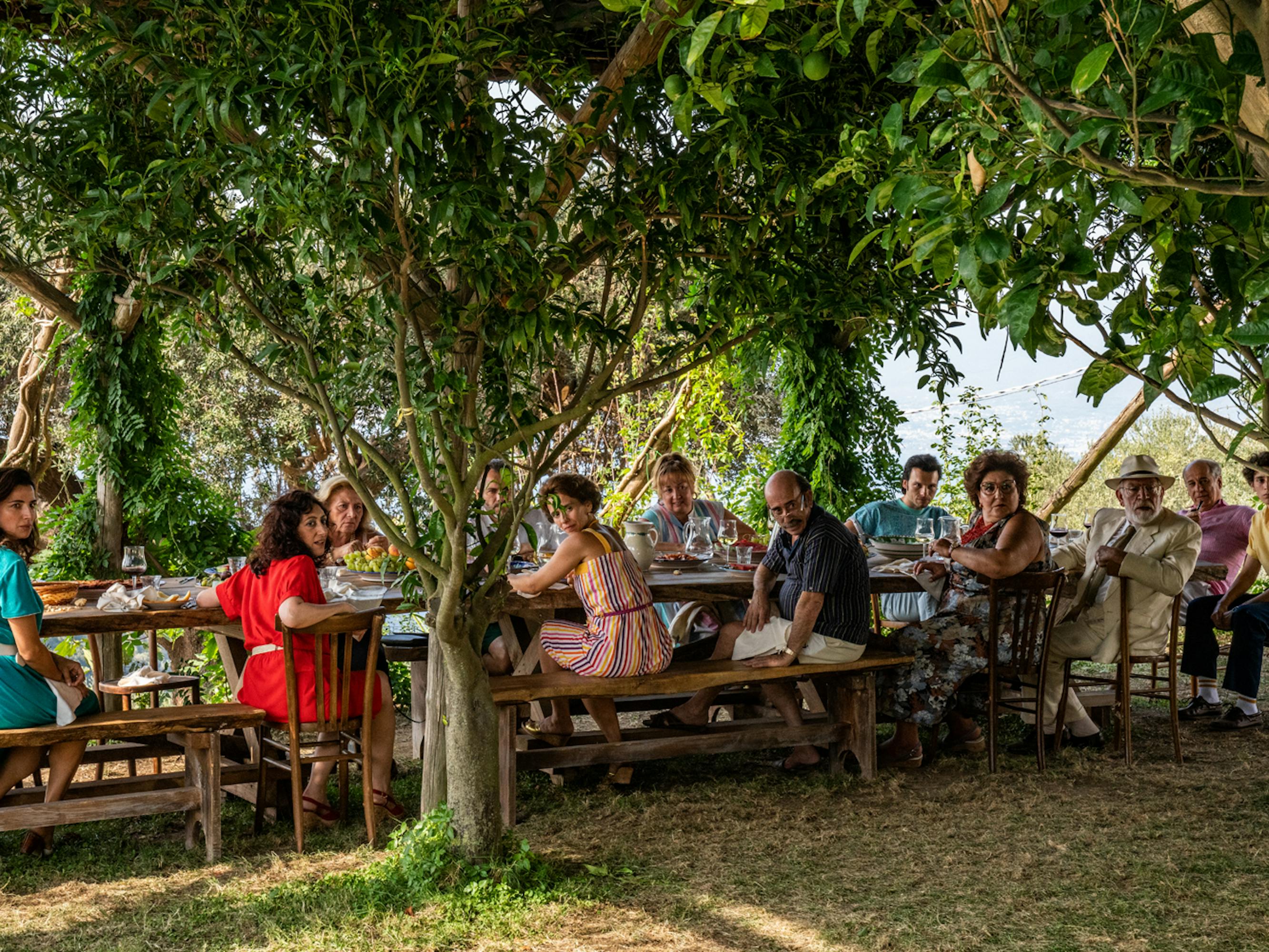
The cast of The Hand of God
JW: The version of Naples, as it appears in the film, were you trying to make it an authentic representation of what Naples was like at that time?
PS: I think that it’s realistic about my environment: I was a middle-class young person, and that Naples, the Naples of the middle class, I think is realistic. But, of course, Naples is many things. It’s a city where there are different kinds of reality. I just followed my memories, how I had the city in my mind when I was 18 years old, and I tried to replicate that city.
JW: Were you going to locations that you had been to as a boy and trying to shoot in the real places where things really happened?
PS: Yeah. The house of the main character is exactly where I used to live. It’s not my house, but it’s a building with six floors. We shot in an apartment that was on the fourth floor, and I used to live on the fifth floor. It was strange because that house where I shot belonged to an old woman that didn’t change anything. Her house was very, very similar to my house when I was 11 years old, [with the] same furniture. She was a friend of my mother, so they had bought furniture from the same shops. It was strange for me to go in and to see, sadly, my past in front of me.
In this case, the locations were exactly the locations of my life, so my style was not very important. In other movies, I do exactly the opposite. I choose a location following my aesthetic, my directorial style.
JW: The lead character is a version of yourself. Were you ever tempted to ask Filippo Scotti to copy your mannerisms? Did he impersonate you at all?
PS: No, I didn’t ask him to play me. I thought, Okay, read the script and develop your idea of this character and follow your idea of this character. He did exactly this. I don’t remember very well how I was when I was 17 years old.
JW: One of the relationships in the second half of the movie was inspired by a director called Antonio Capuano. Who was he and how did he inspire you?
PS: The original guy is a Napolitan director that I met when I was young. I gave him a script that I wrote. He read this script, and it was unbelievable because he proposed that I write a movie with him. At that time, he was 52, 53 years old, and I was 25. We started to write together. It was a very exciting moment in my life. He is very close to the character that you see in the movie. He’s very full of life, full of ideas, always very dynamic. He’s always ready to make movies. And [our relationship] was very important for me because he was always honest and sincere with me — and it was frustrating, but at the same time it was useful because I [learned] many things about writing, about my life. Now, we are good friends. He lives in Naples, and I live in Rome, so we don’t see each other often, but we love each other.
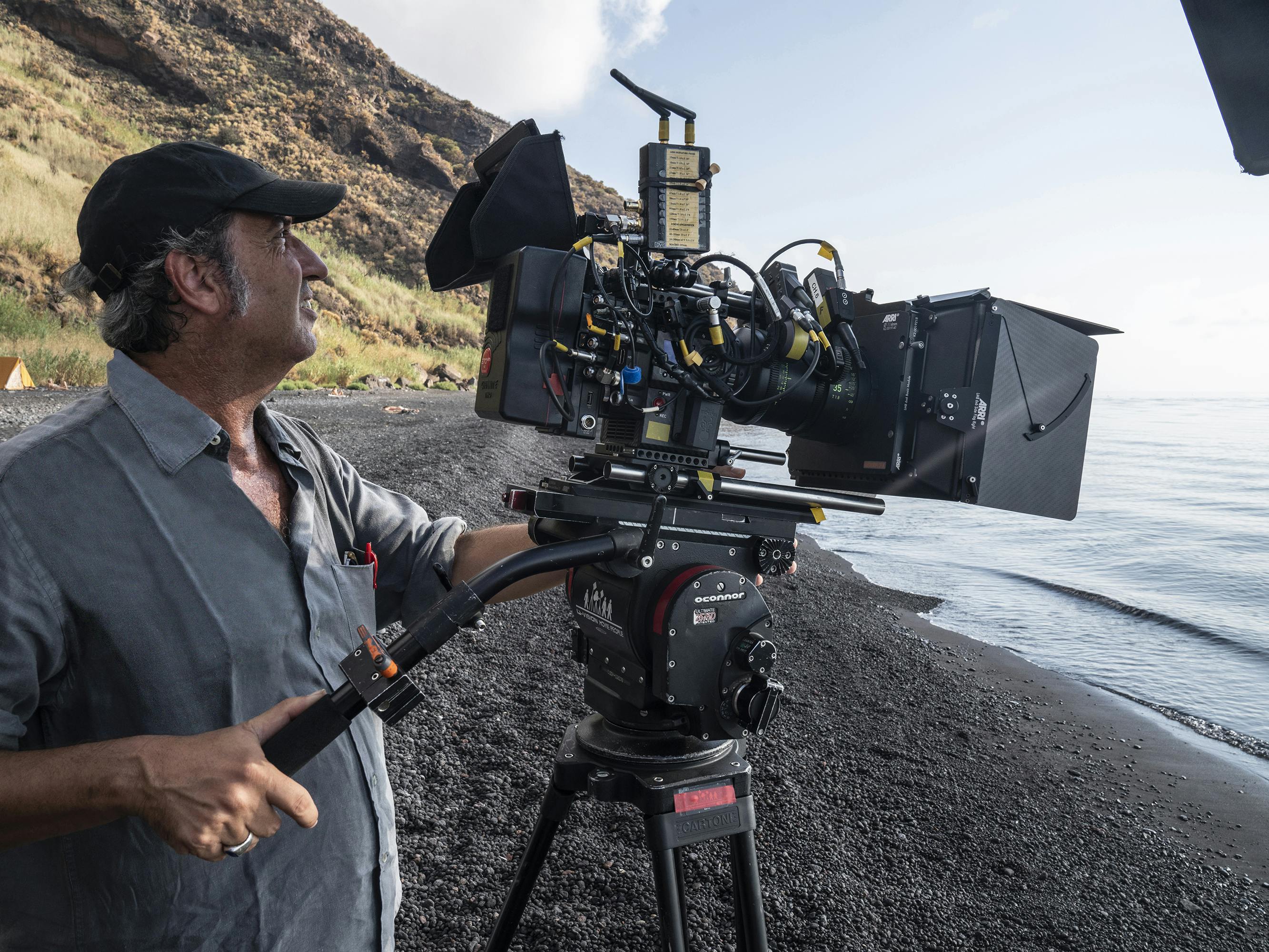
Paolo Sorrentino
JW: When you watch the film, does it move you?
PS: I was moved during the shooting in some scenes, and I was very moved when I saw the first draft of the editing. The risk was, if I am moved by this scene, my thought was also the audience will be moved. But this is a mistake because of course it was my life, so some things that moved me will not move the rest of the world. I started to see the movie many, many times to be distant from the movie and to add the capacity, like in other movies, to say very quickly, “Okay, let’s cut here, here, and here,” and to be cruel with the movie.
JW: Is it important to you that audiences know that this is an autobiographical movie?
PS: No, it’s not so important for me. I hope that they appreciate the movie like a movie. This was a big challenge for me to do a movie about myself that at the same time could be a movie for everybody. For everybody has pain. This is a movie that people can understand better if they have, somewhere inside themselves, a pain.
